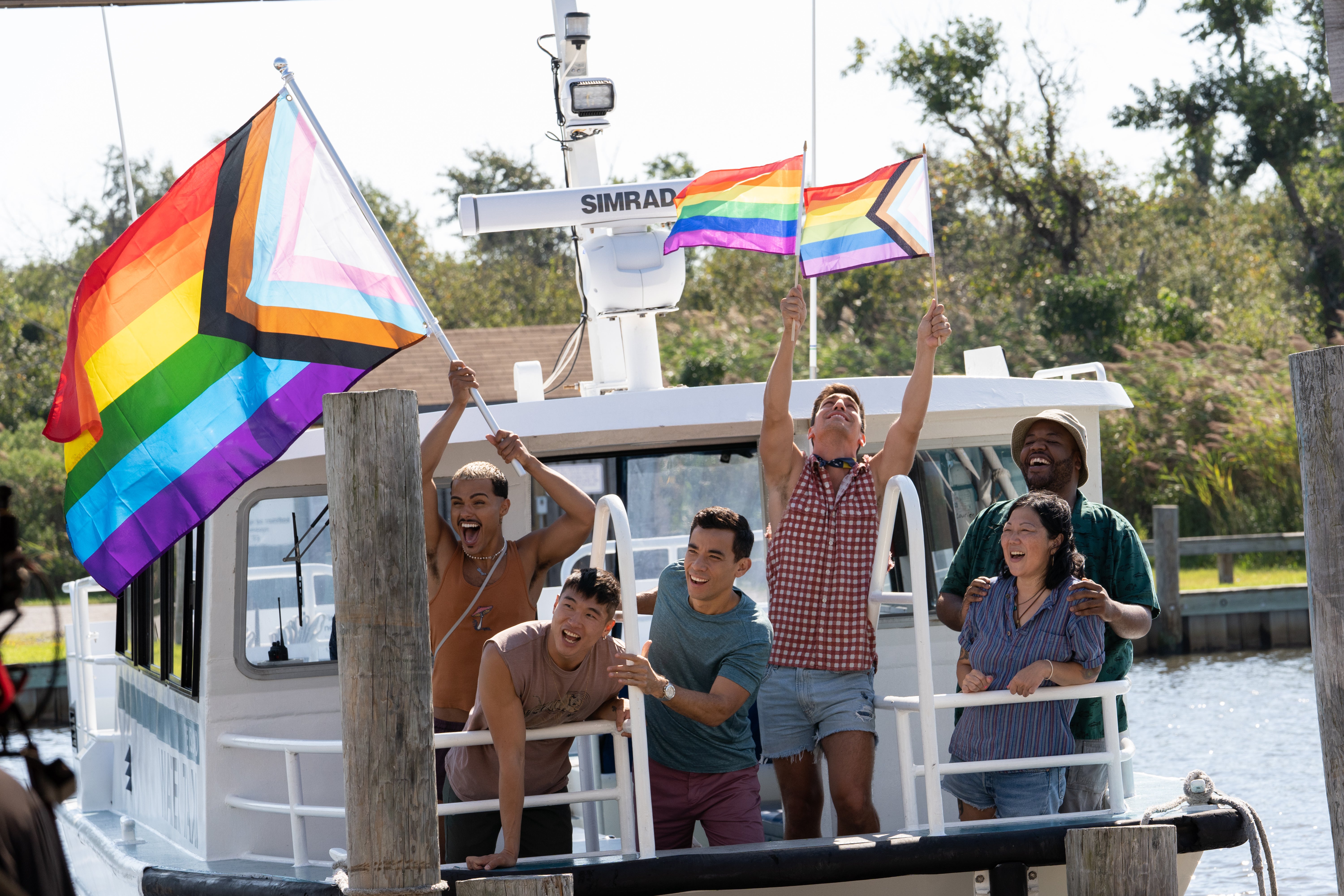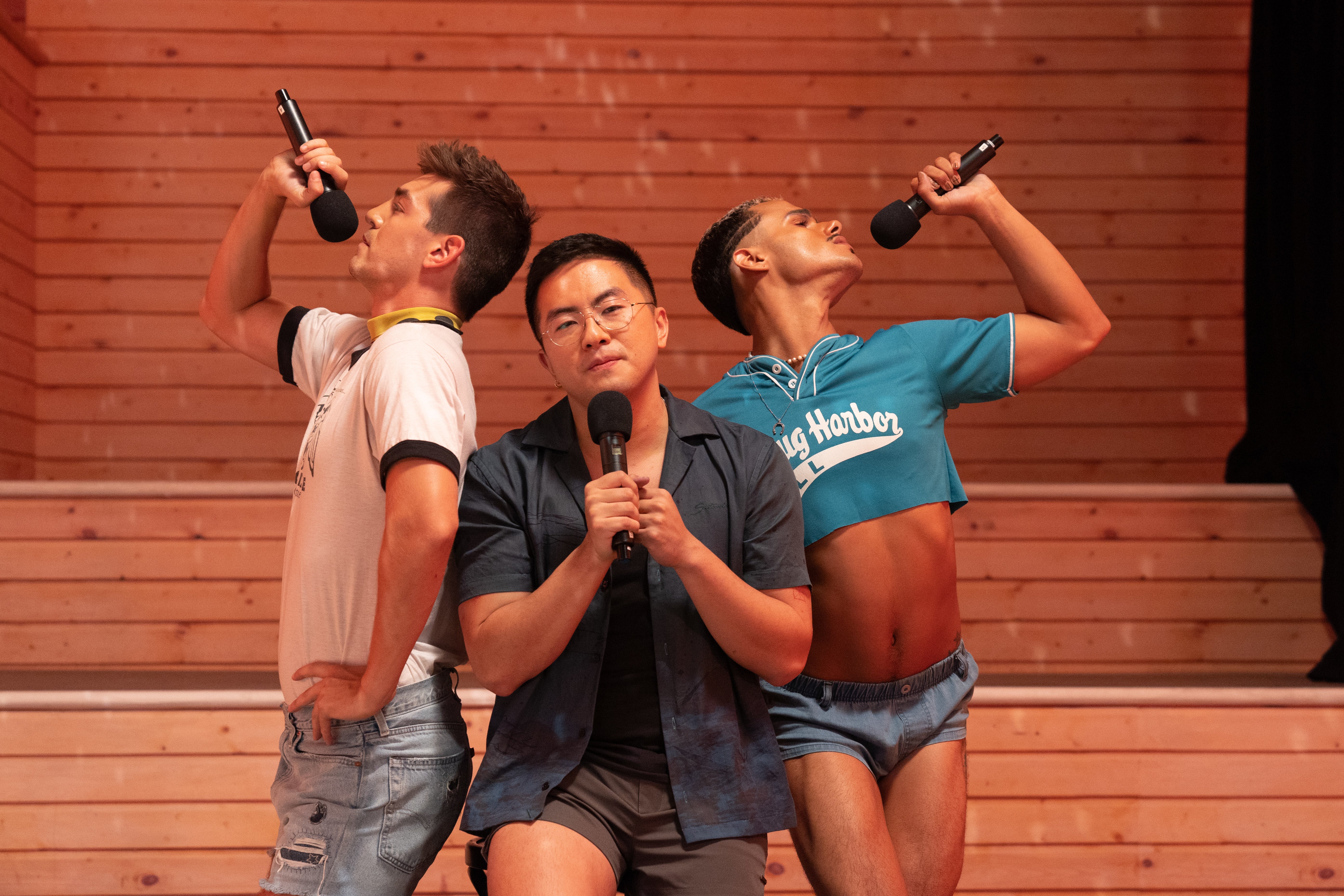Matt Rogers: ‘A lot of people have an antiquated, whitewashed image of what a gay person is’
The US comedian is breaking out this summer, with roles in ‘Pride and Prejudice’-inspired romcom ‘Fire Island’ and ‘I Love That For You’. He speaks to Isobel Lewis about adapting Jane Austen for a queer audience and the ‘truly obnoxious’ event that will be his podcast ‘Las Culturistas’ ending


Your support helps us to tell the story
From reproductive rights to climate change to Big Tech, The Independent is on the ground when the story is developing. Whether it's investigating the financials of Elon Musk's pro-Trump PAC or producing our latest documentary, 'The A Word', which shines a light on the American women fighting for reproductive rights, we know how important it is to parse out the facts from the messaging.
At such a critical moment in US history, we need reporters on the ground. Your donation allows us to keep sending journalists to speak to both sides of the story.
The Independent is trusted by Americans across the entire political spectrum. And unlike many other quality news outlets, we choose not to lock Americans out of our reporting and analysis with paywalls. We believe quality journalism should be available to everyone, paid for by those who can afford it.
Your support makes all the difference.When Matt Rogers was growing up, he had a lot of holidays on Fire Island. They were very heterosexual. Raised in nearby Long Island, the comedian and actor saw the area as a standard holiday resort, the kind of place you’d go with your family. “JWoww from Jersey Shore was a bartender there, you know what I mean?” he tells me. But Rogers knew this wasn’t the whole story. He was aware of Fire Island Pines and Cherry Grove – little pockets of the resort that had been a queer Mecca for decades. “I was always a little afraid of them and nervous about them,” Rogers says. “I couldn’t ever say to anyone, ‘Hey, why don’t we go there for a day,’ because I think that would give me away.’”
In the end, Rogers came out while studying at NYU aged 19. It was here that he also met his long-time collaborator, Saturday Night Live star Bowen Yang. The pair co-host the podcast Las Culturistas, in which they discuss the highs and lows of pop culture, as well as their lives and careers, the latter of which has been on the up for both. For Rogers, there have been appearances in Shrill, Awkwafina is Nora from Queens and Search Party, as well as voicing the excellently named character of Twink in Netflix’s LGBTQ+ animation series Q-Force. No matter the size of the role, Rogers commands the screen, bringing a brightness and joy to every performance.
I speak to him over Zoom from his Los Angeles home at an exciting time. You can tell Rogers is buzzing too. He’s starring in the Vanessa Bayer Showtime comedy I Love That for You alongside comedy icons Jennifer Lewis and Molly Shannon, which is currently premiering in the US. He’s also taking a trip back to Fire Island – although very much not to the parts he visited as a child. No, the comic is travelling back to his mid-twenties, when he first visited the gay areas. It was a thrilling experience, Rogers says, but also “a very anxiety-inducing place to be”.
A hotly anticipated queer romcom is attempting to capture that mixture of excitement and fear. In order to do so, Fire Island draws on some unexpected source material: Jane Austen’s Pride and Prejudice. Written by and starring comic Joel Kim Booster, it asks: what if Regency England were a gay resort and the Bennet sisters were five male friends?
Booster is Noah, the fiery leader determined to make sure his chosen family have the best summer ever (aka the headstrong Elizabeth Bennet). His best friend Howie (Yang), a proxy for Jane Bennet, is a hopeless romantic who often feels undesirable. Rogers is Luke, a stand-in for the bratty Lydia – a part written specifically for him by Booster. “A lot of our followers were like, ‘Oh, of course Matt’s Lydia, he is the only Lydia’ and I was like, ‘Alright, relax,’” he says, with a deliciously dramatic eye roll. “Because it’s kind of a drag. She’s a little bit of a thirsty mess.”
The idea for Fire Island was born after Yang and Booster had been on a resort holiday together; the latter had been reading Pride and Prejudice (“Kudos to him that he brought a book,” quips Rogers). Parallels started to emerge, which Booster first described in an article for Penguin. “[Austen] couldn’t have known it at the time, but while writing about five middle-class sisters during the Regency period, she was also writing about my experience as a gay man in the 21st century,” he wrote.

Booster’s concept was originally commissioned as a series for short-lived short-form video platform Quibi, but it was shelved when the streamer went disastrously bust half a year later. Luckily, Hulu took it on, making it one of very few projects among Quibi’s bizarre roster to live beyond its closure. “Rest in peace, but I think we dodged a major bullet there,” Rogers says.
Upgraded to feature length, the idea was given room to really show what a queer romcom could do. Among all the sex jokes, Grindr hook-ups and partying (in one scene, Rogers’s Luke violently vomits in a vase), there are nuanced conversations around gentrification, as well as prejudices within the gay community. “In our community, money isn’t the only form of currency,” Noah explains in the film’s opening minutes. “Race, masculinity, abs: just a few of the metrics we used to separate ourselves into upper and lower classes.” He may be ripped, but as an Asian man, he still feels invisible.
Rogers describes it as a “clear caste system that comes with having a lot of money, having a great body, being white”. In a pressure cooker environment like Fire Island, it’s inescapable. Here, the Austen comparisons become clear. The need for social mobility, the longing to be desired – these are timeless emotions. “Something that’s also timeless, unfortunately, is being colonised in terms of your desires and being told your entire life: this is what you should want and this is what you should value,” he adds.

Watch Apple TV+ free for 7 days
New subscribers only. £8.99/mo. after free trial. Plan auto-renews until cancelled

Watch Apple TV+ free for 7 days
New subscribers only. £8.99/mo. after free trial. Plan auto-renews until cancelled

It was important to weave these nuanced aspects of gay culture into the film. “There are still a lot of people out there who think ‘gay person’ and they see a very specific image in their mind and it’s an antiquated, whitewashed image of what a gay person is,” Rogers says. “Our community is so not monolithic – it’s very vast and it’s extremely diverse.”
Getting to create this film with a majority queer cast and crew was an emotional experience for all involved. Since moving to the west coast, it has been harder for Rogers and Yang to spend time together IRL. Still, the pair still make time to (usually virtually) record Las Culturistas every week for the listeners (or readers, as their subscribers are called).
“Las Cultch”, as it’s affectionately known, is a show with its own language built in. Random phrases become “rules of culture” and are repeated in unison, such as “movie magic is HUGE in Hollywood” and “there should be no straight art”. Celebrating 300 episodes last month, the pair released a three-part, six-hour special counting down the 300 most important songs in “the great global songbook”. Demi Lovato’s “Cool for the Summer” was given the top spot – as it should.

But for all the silliness and Real Housewives chat, Las Culturistas has real depth and vulnerability. The pair started the podcast in “the great before” of 2016, pre-Trump presidency and pandemics. “[The listeners] have been with me through breakups, they’ve been with me through professional disappointments,” he says. “They’ve been with Bowen through getting Saturday Night Live and becoming truly famous… and they’ve been with us through stages of our friendship.”
As the pair’s diaries get fuller, recording has been a little “touch and go”. If the show ever does end, Rogers promises it’ll be a “truly obnoxious” event. “You know when certain celebrities say they’re pregnant, and then it feels like they’ve been pregnant for a million years?” he says. “It’ll be like that when we end the podcast.”
Each episode of Las Culturistas ends with “I Don’t Think So, Honey”, a segment where the pair rant non-stop for 60 seconds about something in pop culture that’s been grinding their gears. Think Just A Minute, but with infinitely more sass. Our time running out, I ask Rogers what Luke from Fire Island’s “I Don’t Think So, Honey” would be. His face breaks into a smile. “Oh my god, that is so funny,” he says. “I think his ‘I Don’t Think So, Honey’ would be ‘I Don’t Think So, Honey, Noah’ – because Noah gets all the attention… I think that Luke is a little blinded by wanting so badly to be the wanted one.” Timeless, then – although Austen didn’t have to deal with dating apps. Lucky her.
‘Fire Island’ is on Disney Plus now



Join our commenting forum
Join thought-provoking conversations, follow other Independent readers and see their replies
Comments